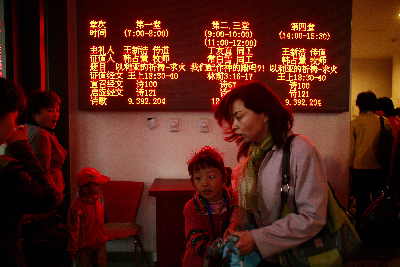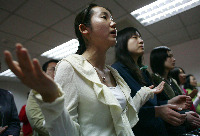 José M. Osorio/Chicago Tribune/MCT
José M. Osorio/Chicago Tribune/MCT
World News Desk
Learn the why behind the headlines.
Subscribe to the Real Truth for FREE news and analysis.
Subscribe NowTraditional Christianity in China, which has for many years existed underground under heavy pressure from Beijing, is gaining strength, attracting the poor, the middle class and the higher educated segments of society.
Homegrown evangelical movements of Catholicism and Protestantism have not only managed to thrive in rural villages and temples, but also in urban areas forming elaborate house networks of worshippers. Professing Christians have become vocal about their freedoms and openly assertive of their opinions on socio-political and economic issues.
Several factors are said to contribute to this newfound religious fervor: A growing desire to pursue moral and ethical standards against the rapid rise of capitalism and greed, which has worsened corruption and increased pollution; Western-educated Chinese returning from overseas espousing traditional Christian values; and the influence of Western English teachers in China.
In the past, professing Christians have had to practice their religion underground, in fear of government-sanctioned oppression, including torture and imprisonment. But today, the Chinese government is tolerating Christian belief, giving adherents—an estimated 70 to 110 million members in China—leeway to be more open and active. In the 17th Communist Party Congress, the word “religion” was introduced in the Communist Constitution, placing it in accord with the National Constitution.
Based on 2004 figures, the Self-Patriotic Movement and Christian Church Council (now merged as TSPM-CCC) has 32,000 churches, 16,000 meeting places,18 million members, and 2,600 ordained ministers.
Traditional Christianity’s growth in China is also evident in the sales of Bibles. China—the world’s most populous atheist nation—is fast becoming the largest printer of the Holy Bible. Nanjing Amity Printing (NAP), the largest Bible factory on earth, has printed 50 million copies; 37.5 million (or 75 %) are sold locally, while the rest are exported to 60 countries.
 José M. Osorio/Chicago Tribune/MCT
José M. Osorio/Chicago Tribune/MCTThe first missionaries in China were from the East, who brought the teachings of traditional Christian belief to the Mandarins Tang Dynasty. In 1949, Christianity was repressed and adherents were not allowed to practice their faith openly. Although China’s constitution has allowed freedom of religion, it has many clauses limiting the practice of religion. The Fa Lun Gongs, for example, were labeled as a cult when they tried to be more critical of government prohibition on Christianity.
Over the course of history, traditional Christianity grew even under intense persecution, as it did in the ancient Roman world, in the Soviet Union, in communist East Germany, and even during the Reformation of Martin Luther and other Protestant luminaries. The clamping of the religious movements in China has not dampened the enthusiasm of Christians.
Today, China’s five major religious groups are Taoism, Buddhism, Islam, Catholicism and Protestantism.


